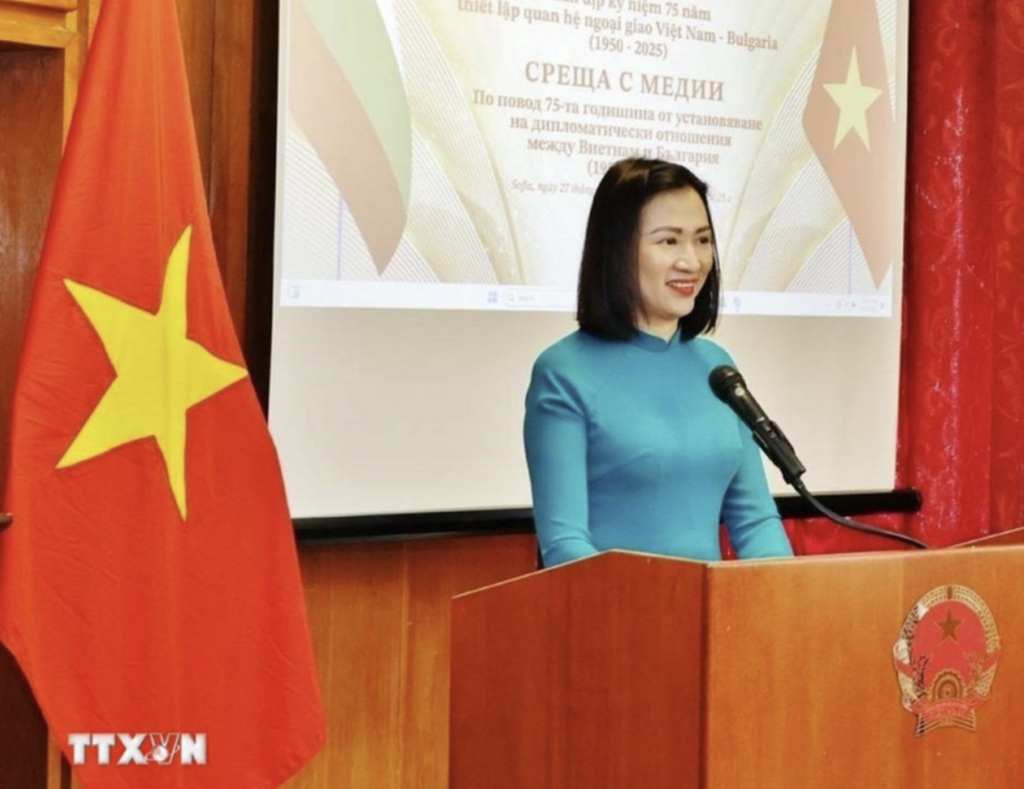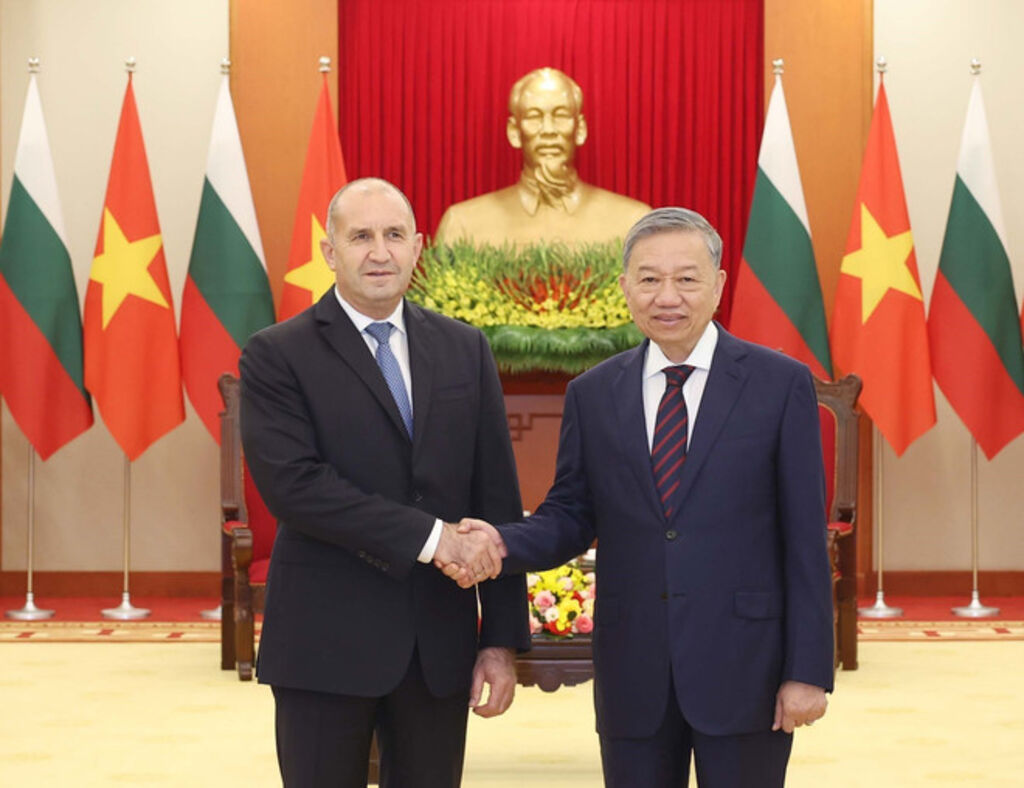 |
| Vietnamese Ambassador to Bulgaria Nguyen Minh Nguyet__Photo: VNA |
The upcoming official visit to Bulgaria by Party General Secretary To Lam is a symbol of political trust, enduring friendship, and shared aspirations of the two countries' people, creating new momentum to elevate the bilateral relations to new heights worthy of the 75-year tradition of friendship and great cooperation potential, Vietnamese Ambassador to Bulgaria Nguyen Minh Nguyet has said.
Speaking with the Vietnam News Agency (VNA)'s correspondent in Central Europe, Nguyet noted that this is the first visit by a Vietnamese Party chief to Bulgaria in 50 years, marking a new milestone in the traditional friendship. Taking place at a time when the two countries are celebrating the 75th anniversary of diplomatic relations (1950–2025), the trip is also the fourth high-level exchange in just three years, underscoring the strong political ties and growing strategic trust between their leaders.
According to the diplomat, the visit comes at a time when both Vietnam and Bulgaria are achieving significant progress in socio-economic development as well as in regional and international integration. With a strong determination for reform and deep integration, Vietnam is streamlining its institutions and administrative apparatus. Just days after the visit, the Southeast Asian nation will host the opening for the signature of the UN Convention against Cybercrime (Hanoi Convention), further reflecting the country’s growing prestige and position on the global stage.
Meanwhile, Bulgaria has joined the Schengen Area after 13 years of preparation, is set to enter the Eurozone on January 1, 2026, and is actively advancing toward membership in the Organization for Economic Cooperation and Development (OECD). The country has also expressed a strong desire to deepen ties with Vietnam.
Nguyet added that over the past 75 years, the two countries have maintained stable, trustworthy, and increasingly profound relations, grounded in a rich history of political and emotional connections between their people. More than 30,000 Vietnamese have lived, studied, and worked in Bulgaria over the decades.
In recent years, despite global uncertainties, the bilateral relations have continued to thrive, reflected in frequent high-level exchanges and practical cooperation initiatives.
In May 2024, the two countries successfully held the 24th session of the Vietnam-Bulgaria Intergovernmental Committee for Economic, Trade, and Scientific-Technical Cooperation in Sofia. The session reviewed the overall progress of cooperation and identified new priority areas such as digital economy, information technology, innovation, biomedicine, green transition, and high-quality human resources training and supply.
 |
| Party General Secretary To Lam (R) and President of Bulgaria Rumen Radev in Hanoi on November 25, 2024__Photo: VNA |
In the economic and trade sphere, both sides have been actively implementing cooperation programs within the framework of the EU – Vietnam Free Trade Agreement (EVFTA), expanding market access and diversifying supply chains.
Last year, bilateral trade turnover increased by nearly 30% year-on-year. In the first nine months of 2025, Vietnamese exports to Bulgaria continued to grow strongly, particularly in agricultural products, textiles, and light industrial goods. In the field of investment, Nguyet shared that the Bulgarian National Assembly ratified the EU–Vietnam Investment Protection Agreement (EVIPA) in September 2023, creating a more favorable legal framework for bilateral cooperation. Bulgarian businesses have shown growing interest in the Vietnamese market, particularly in pharmaceuticals, biotechnology, renewable energy, agricultural processing, and logistics.
Conversely, Vietnamese firms view Bulgaria as a “gateway” to the EU market, thanks to its strategic geographic location, well-developed transport infrastructure, and significantly improved business environment. Bulgaria is also considered a promising destination with reasonable production costs, suitable for Vietnamese firms to invest in the production of processed agricultural goods, textiles, and footwear, thereby expanding their presence in the European market.
Labor cooperation is emerging as a new and promising area. In response to Bulgaria’s labor shortages, an increasing number of Vietnamese workers have come to this European country to work in such sectors as construction, engineering, food processing, and health care. Both sides have shown their wish to establish a new labor cooperation mechanism aimed at sustainable, humane, and mutually beneficial collaboration, while further strengthening people-to-people ties between the two nations.
Cooperation in education and science continues to be a bright spot, the diplomat went on. Each year, the two sides maintain exchanges of students and researchers under the education cooperation agreement between the two Governments. In the 2025–2026 academic year, Vietnam’s Ministry of Education and Training has for the first time sent Vietnamese language lecturers to teach at Sofia University, marking a new milestone in academic and linguistic exchange.
Along with close collaboration in culture, tourism and people-to-people exchanges, Vietnamese and Bulgarian localities have actively strengthened their partnerships by seeking twinning or development cooperation opportunities.
These comprehensive results show that the Vietnam-Bulgaria relationship is entering a more dynamic, substantial and comprehensive development phase, based on the foundation of traditional friendship, political trust and close attachment between the two countries' people, Nguyet affirmed.
According to the ambassador, one of the important factors that helps the bilateral relationship develop continuously is the high level of political trust. Vietnam considers Bulgaria a reliable traditional partner, which plays a bridging role between Vietnam and the EU. For their part, Bulgarian leaders always affirm that Vietnam is a top priority partner in Southeast Asia, and at the same time support Vietnam in strengthening its comprehensive relationship with the EU.
The leaders of the two countries also share many similarities in their development vision, aiming for peace, cooperation, integration and sustainable development, on the basis of respect for international law, independence, sovereignty and territorial integrity of each country. Both sides affirm their support for multilateralism and the rules-based international order, with the United Nations playing a central role, while emphasizing the respect for and full compliance with international law, and the peaceful settlement of disputes in accordance with the UN Charter.
Regarding future cooperation prospects, Nguyet stressed that the two countries have many favorable conditions to boost comprehensive collaboration, and promote complementary strengths. Potential areas include green transition and digitalization; education, science and technology; joint research in smart agriculture and biomedicine; clean energy; tourism and people-to-people exchanges, aiming to open direct flights, enhancing the promotion of the two countries' images.
General Secretary Lam's official visit to Bulgaria this time demonstrates the strong political determination of the two countries in bringing their relations to a new level, for peace, prosperity and sustainable development of each country and of the two peoples.- (VNA/VLLF)









